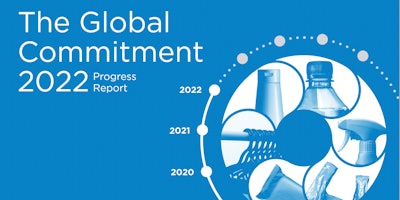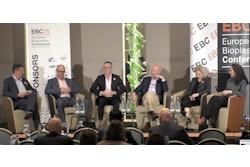While it may come as no surprise, it’s still disheartening to learn directly from the Ellen MacArthur Foundation itself that the goals set by the 1,000 signatories to its New Plastics Economy Global Commitment to reduce their use of plastic by 2025 “will likely not be met.” In fact, not only will they not meet their goals, in a few areas, companies have increased their use of the material. That’s according to EMF’s 2022 progress report, released in early November 2022.
The Global Commitment is made up of five targets. The first is that 100% of signatories’ packaging will be reusable, recyclable, or compostable by 2025. According to the report, for two consecutive years, brands and retailers have slightly increased their use of reusable, recyclable, and compostable plastic packaging, from 63.2% in 2019 to 65.4% in 2021. Although that number reflects progress, to reach their goals, signatories will need to move the needle 34.6% in just three years—a massive jump from the 2.2% achieved over the previous two.
Another target, to increase the share of post-consumer recycled content across all plastic packaging, was embraced by all signatories, but to different degrees—from 20% to 100%, resulting in an aggregate target of 26%. Here, EMF says, the combined 2025 target remains in reach if efforts are accelerated, given that signatories more than doubled their use of PCR since 2018 from 4.8% to 10%.
Progress on another target, the commitment by brands and retailers to decrease their use of virgin plastic—from 0.5% to 100%, with an aggregate target of 20%—is moving in the wrong direction however. According to the report, following two years of declining virgin plastic use, brand and retail signatories’ aggregated use of virgin plastic has risen 2.5%, returning to 2018 levels of 11.9 million metric tons. While 59% of signatories did report a reduction in their use of the material, some of the largest global packaging users registered an increase. Among them, Mars, Inc. increased its use of virgin plastic by 11% (since 2019), PepsiCo by 5% (since 2020), Mondelez by 4% (since 2020), and The Coca-Cola Company by 3% (since 2019).
“The reason some businesses have not hit peak virgin plastic is due to increases in their total plastic packaging use,” explains EMF. “This reinforces the need for businesses to decouple growth from the use of plastic packaging.”
Regarding the signatories’ commitment to move away from single-use to reuse models where relevant—a qualitative target—here too there has been negative progress, with a slight decline in 2021 to an average of 1.2%, from 1.5% in 2019. “The first quantitative reuse targets were announced by a few major brands this year. More broadly, however, both progress and ambition on reuse are still lacking as demonstrated by the low—and slightly decreasing—share of reusable plastic packaging,” reads the progress report.
“The shift away from single-use towards reusable packaging is a critical part of eliminating plastic pollution,” the report continues. “While improving recycling is critical, we cannot recycle our way out of the plastic issues we currently face. Wherever relevant, reuse business models should be explored as a preferred option… .”
The fifth target, to eliminate problematic or unnecessary plastic packaging, also a qualitative goal, has had some bright spots though, with examples of elimination efforts across all packaging types and categories increasing compared to 2020. These have mainly been delivered through changes in material, for example paper substitution or lightweighting, compared to a fundamental change in the packaging, or direct elimination, at 22%.
Overall, EMF believes that “measurable progress” has been made against the Global Commitment, but blames two factors for making 2025 targets unattainable: the use of flexible packaging and a lack of investment in collection and recycling. “Flexible plastic packaging, such as sachets and films, pose a significant problem,” says EMF. “The difficulty of recycling them—in practice as well as at scale—is a key reason why most businesses will miss their target of using only reusable, recyclable, or compostable plastic packaging by 2025.”
As regards the state of recycling, it says that “many businesses have been investing in ways to achieve 100% technical recyclability for rigid plastic packaging, but the benefit of this investment is being stifled by inadequate collection and sorting infrastructure around the world.”
Still, despite the signatories’ slow rate of progress toward the five targets and the hurdles that stand in the way of reaching these goals, EMF emphasizes that the Global Commitment will continue to drive progress, provide unprecedented transparency, and inform legislation.
Says Sander Defruyt, plastics initiative lead for the Ellen MacArthur Foundation, “The Global Commitment continues to provide unprecedented transparency on how major businesses are addressing the plastic pollution crisis. The latest findings demonstrate the need to urgently ramp up efforts—both from businesses and governments.
“Credible, ambitious plans are needed from businesses to scale reuse, to deal with the issue of flexible packaging, and to reduce the need for single-use packaging. Governments must take action to help accelerate progress.
“In parallel, we must work towards establishing an ambitious treaty to end plastic pollution. Organizations such as the recently launched Business Coalition for a Global Plastics Treaty—convened by the Ellen MacArthur Foundation and WWF—are here to help governments grasp this once-in-a-generation opportunity.”



























